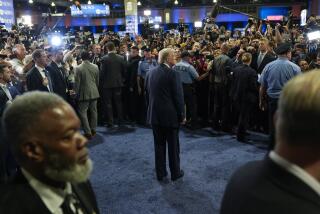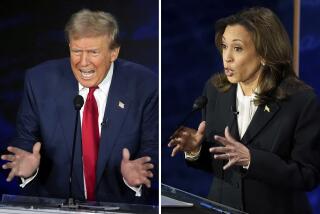Newsletter: Essential Politics: Trump commands the stage even as he boycotts it
I’m Christina Bellantoni, the Essential Politics host today. Let’s get started.
If a Republican presidential debate is held and Donald Trump is not on the stage, will anyone watch it?
In this election cycle and with just days to go until Iowa’s first-in-the-nation caucuses, the answer is certainly yes. But the real estate mogul and GOP front-runner’s decision to skip Thursday’s debate due to a feud with Fox News’ Megyn Kelly raises the question of its importance.
And Trump’s move illustrates yet again how he is setting the terms of this race. Consider how much time moderators at each forum have devoted to Trump — on stage, off stage, at forums for the lesser-known candidates and in the days following — since that first debate in August. Without him, the other candidates will have that much more time to make their case.
Sen. Ted Cruz challenged Trump to a one-on-one debate instead.
In other campaign news, Trump earned a trio of endorsements Tuesday: from a sheriff known for his anti-immigration stance, a prominent evangelical leader and a former major league pitcher known for being outspoken about his not so politically correct beliefs.
Kate Linthicum reported from Marshalltown, Iowa, as a growing Latino community in this formerly mostly white manufacturing and farm city has risen up to protest Trump.
The Democratic candidates continued to barnstorm following a town hall with Iowans that Cathleen Decker described as the hopefuls paring the race down to its essence: Do Democrats want the revolution Sen. Bernie Sanders pledges or the experienced continuity Hillary Clinton promises?
Follow the action in Iowa on Trail Guide.
OBAMA OPERATIVE RUNNING FOR MAYOR OF LOS ANGELES
Peter Jamison talked to Mitchell Schwartz, who plans to challenge Mayor Eric Garcetti in 2017. Calling himself “a little bit of an underdog,” the longtime Democratic operative said he plans to take out papers for his campaign in the coming weeks.
A political strategist who directed Barack Obama’s 2008 campaign in California and served as communications director for the State Department under President Clinton, Schwartz, 55, would be the first challenger with a significant political resume to enter the race.
BROWN: LESS ‘SPECTACLE’ FROM POLITICIANS
Knowing a thing (or three) about presidential campaigns, Gov. Jerry Brown told a group of scientists on Tuesday that both presidential candidates and Congress need to do more to prevent the catastrophes that could lead to global doom.
Brown was in Palo Alto for the unveiling of the latest “Doomsday Clock” from the Bulletin of the Atomic Scientists. The organization kept its iconic clock at 3 minutes to midnight — a symbol of the dangers of nuclear Armageddon.
As Sacramento Bureau Chief John Myers writes, the governor warned political leaders to stop “the spectacle and the silliness” and focus on what matters in combating terrorism, climate change and nuclear destruction.
“We’ve got to wake up,” said Brown. “We’ve got to face the Apocalypse and prevent it.”
NEW SACRAMENTO SHOWDOWN OVER UC ENROLLMENT?
Myers also reports on a new fight brewing in the statehouse over how many in-state students are given spots at the University of California.
After a recent report showing overall nonresident enrollment rising, two state legislators introduced a bill Tuesday to impose a formal cap on nonresident enrollment. The legislation would also mandate that half the tuition paid by nonresidents go toward helping increase enrollment of California students.
What’s unclear, though, is exactly how much power legislators can exert given the UC system has a lot of independence under the California Constitution. Two of the most popular campuses, UCLA and UC Berkeley, already have caps on how many students can enroll from outside the state.
Keep up with all of the latest news and notes from Sacramento and around the state on our Essential Politics news feed.
TODAY’S ESSENTIALS
— Evan Halper looks at what has happened as presidential campaigns push into a new frontier of voter targeting, scouring social media accounts, online browsing habits and retail purchasing records of millions of Americans: The trend has brought with it a privacy imposition unprecedented in politics. By some estimates, political candidates are collecting more personal information on Americans than even the most aggressive retailers.
— Christine Mai-Duc has the details of a Board of Equalization vote to back bills that would affect how taxes are collected on medical marijuana and feminine hygiene products.
— State legislators are poised today to vote on a bill legalizing fantasy sports games. Patrick McGreevy reports the industry is already pushing back with a PR campaign against one lawmaker who’s been an outspoken critic.
— Frustrated with the pace of toxic cleanup efforts surrounding a shuttered battery recycling plant in Vernon, state and local politicians are pressing for swifter action from the Brown administration, Melanie Mason reports.
— The Democratic Congressional Campaign Committee in a statement Tuesday sought to ding Rep. Jeff Denham (R-Turlock) for supporting efforts to cut off federal funding to abortion clinics like Planned Parenthood.
— California’s state controller says the total price tag to pay for healthcare benefits promised to government workers has gone up to a whopping $74.1 billion.
LOGISTICS
Miss yesterday’s newsletter? Here you go. Did someone forward you this? Sign up here to get Essential Politics in your inbox daily. And keep an eye on our politics page throughout the day for the latest and greatest. And are you following us on Twitter at @latimespolitics?
Please send thoughts, concerns and news tips to politics@latimes.com.
More to Read
Get the L.A. Times Politics newsletter
Deeply reported insights into legislation, politics and policy from Sacramento, Washington and beyond. In your inbox three times per week.
You may occasionally receive promotional content from the Los Angeles Times.











